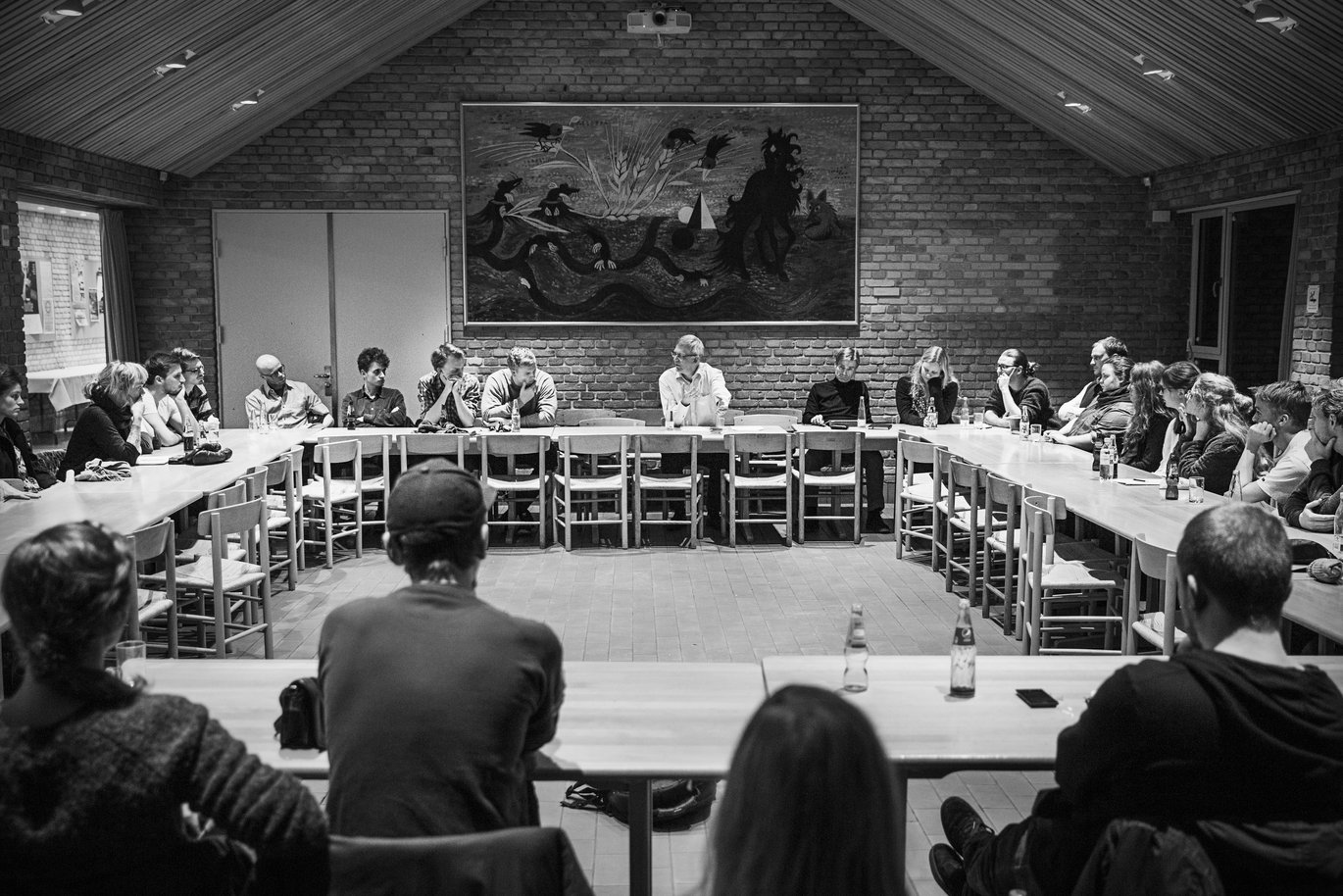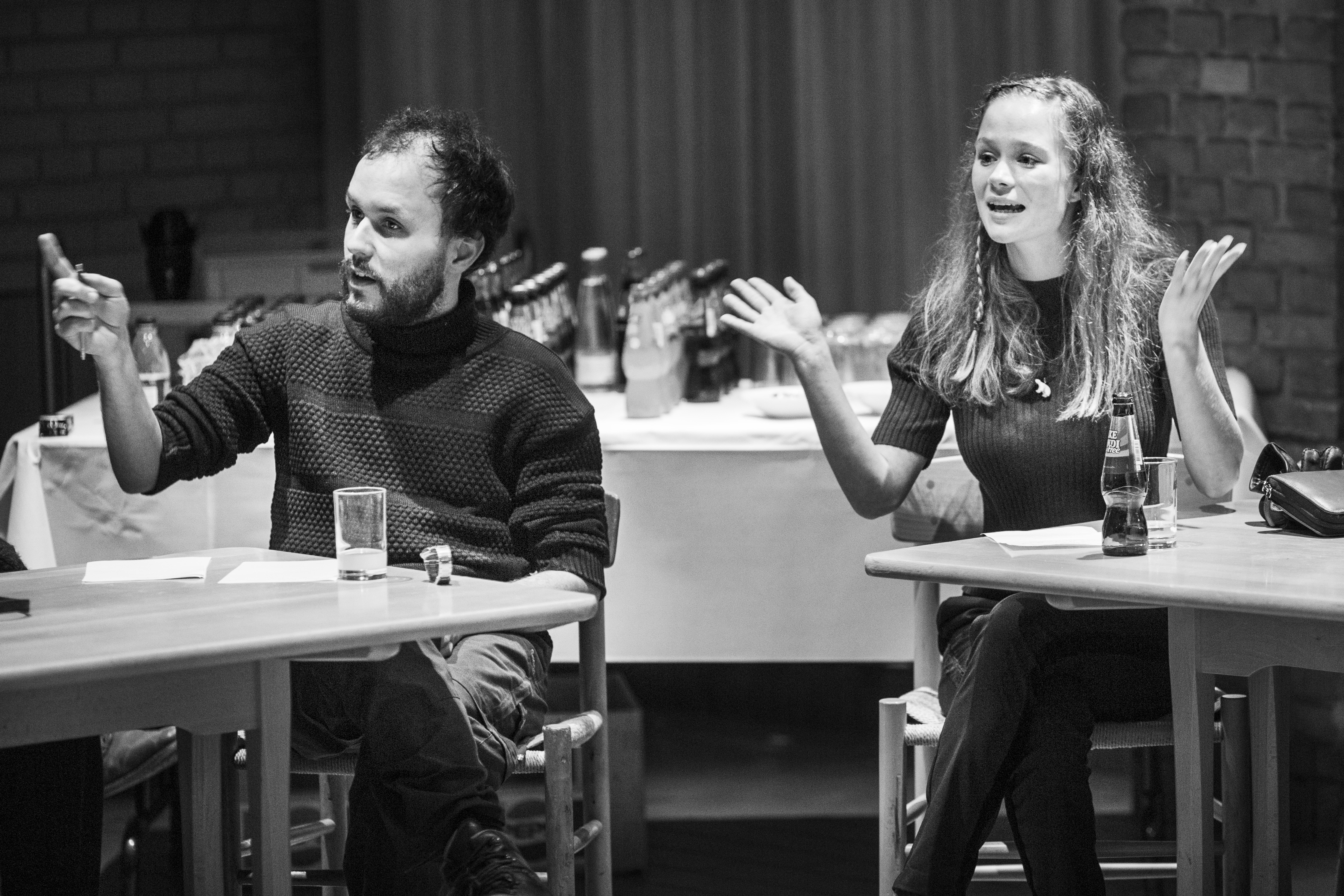Rector on his dialogue with dissatisfied students: "It pains me to hear that"
Two months have passed since the student movement “A different university" staged a blockade of the Rector's Office at AU. On 26 January the rector met with the dissatisfied students in a more formal setting for a dialogue among equals. But is that what it was? The meeting developed into an academic discussion about democracy and the students' opportunities for political influence.



While Denmark’s male handball team was steadily increasing its lead over Iceland in the World Cup being shown on the big screen in Stakladen on 26 January, the score was much closer in the Mogens Zieler conference room down the corridor.
Here the student movement "A different university" had invited Rector Brian Bech Nielsen to a meeting about the winter blockades and demonstrations at AU. At the same time, they hoped to find common ground with the management so that the rector would no longer need to have the phone number for East Jutland police on his telephone.
The management at AU has previously indicated their sympathy with the students in the fight against the study progress reform and the degree programme resizing. But the students have their doubts, especially after the management twice summoned the police to put an end to the student blockades in November. They also think that the rector has been too passive in the public debate.
This was the starting point for the meeting in the Student House, a meeting that developed into an academic discussion about democracy which would excite any lecturer in the history of ideas and political science.
Lesson 1: The social contract
The rector was given the chance to open the debate with a basic lesson.
"Who owns the university?" he asked rhetorically. "All of us together. It is society's university."
And as we all know, society is governed by politicians who are democratically elected to govern and legislate, he said, before continuing:
"When you collect taxes you also have a responsibility to those you collect them from. And there aren’t any politicians who can get away with not making demands of those who they give money to. This is also true of the universities.”
The rector did, however, also emphasise that the demands must not get out of hand. The students should therefore be driven by motivation, creativity and insubordination.
"A university lives on criticism. Without criticism there is no quality," he said concluding his presentation.
Lesson 2: Problems in the representative democracy
And that’s just what he got – 23 critical questions from the 40 or so students present.
Spokesperson for "A different university” Søren Mau challenged the rector’s claim that something automatically has a democratic legitimacy just because it has the backing of 90 seats (required for a majority, ed.) in the Danish Folketinget (the Danish parliament, ed.).
"It makes no sense to say that the University Act is democratic just because it was adopted by a majority in the Danish Folketinget," he said, before he presented his own view of democracy:
"Democracy is when you can influence the surroundings and the social communities which you are a part of. So the correct and democratic way to continue to work from here is to mobilise even more students and staff at the university and to fight together with others in the educational sector against the government," he said.
The point made by Søren Mau - that student votes in a general election cannot be converted to real influence at the university - was elaborated on by one of the other participants, former history and history of ideas student Lars Henrik Carlskov:
"It’s not possible to transfer democracy across so many layers. About 40 per cent of voters voted for the current majority in the Danish Folketinget, from which a government is formed, which in turn appoints a committee who appoint a University Board, who in turn appoint the rector," he said.
Lesson 3: The democratic toolbox
But Brian Bech Nielsen maintained his starting point.
"I’m really fond of the representative democracy we have in Denmark and the set of rules that apply within its framework. I’m ready to measure up to them – also at the university," he said.
As long as "A different university" keeps to what the rector termed "the democratic toolbox" then he would welcome the students' commitment and love of the university.
Demonstrations are just fine, he said. But when a blockade prevents participants from attending an open democratic meeting, which is what happened in November when the Quality Commission held a conference in Stakladen, then you have gone too far, he said.
That was also an attitude that the participants from “A different university" challenged. Especially Lars Henrik Carlskov, who was armed with some heavy historical weaponry.
"In Denmark, blockades have been a popular weapon for the trade union movement and have had huge importance for the society we have today. They have also been used by movements as different as the colonial independence movement in India and the American civil rights movement, neither of which are in my view undemocratic," he said.
Lars Henrik Carlskov also pointed out that the Confederation of Danish Industry doesn’t exactly have to sit on a portable mattress in a cold corridor to make its voice heard.
Lesson 4: A dialogue among equals
This led the representatives from "A different university" to present a desire for a more equal dialogue with the senior management team in future.
"This possibility does not exist at the moment. We try, but we are not taken seriously. The future perspective we are working on is a collaboration with you where we are on an equal footing and thereby also a dialogue among equals," said Signe Uldbjerg Mortensen, a student of Scandinavian studies.
Brian Bech Nielsen was disappointed to here this.
"It pains me to hear that. At least we are having a dialogue here in which there is give and take and viewpoints are being exchanged. Of course it’s true that when we leave the room, I will have other opportunities to act than you will. But to take that and then conclude that this is not an equal dialogue is, I think, a strong statement," he said.
Lesson 5: Solidarity
But what the students wanted to know was, if the senior management team really sympathises with the students and their dissatisfaction with the study progress reform and degree programme resizing, then why doesn’t Brian Bech Nielsen make greater use of the “other options" at his disposal to put pressure on the Minister for Higher Education and Science Sofie Carsten Nielsen?
"From your privileged position you could hope there was a certain degree of solidarity and that you could openly say that you support our fight. You say that criticism is important, but where is the public criticism? We can’t see it," he said.
Brian Bech Nielsen replied that it was partly a question of timing.
"With regard to the study progress reform, my clear impression is that if I go out in the media now and start making a noise, it won’t have any effect whatsoever. Here my best opportunity is to speak directly to the Minister."
The rector also reminded the students that it was possible to get the plans for degree programme resizing altered before the agreement was finalised.
"And with all due respect, it wasn't the actions of "A different university" that led to us getting the immediate phasing in period lengthened to up to seven years," he said.
Translated by Peter Lambourne
The rector will discuss closed items at board meetings with AU's chairman of the board
During the debate the rector promised the students that he would look into the possibility of fewer closed items at the AU board meetings.
"I would like to promise to enter into a dialogue with Michael Christiansen to establish how the situation is with open items at the other universities. If it is correct that there are significantly fewer closed items there, then it could be possible to move in that direction," he said.
The direct invitation came from the chairman of the Student Council, Allan Vesterlund Graversen, who had otherwise planned to just listen to the debate, but who could not refrain from taking part when the board meetings were discussed. The chairman of the Student Council argued that Denmark’s other universities demonstrated a completely different degree of openness.

